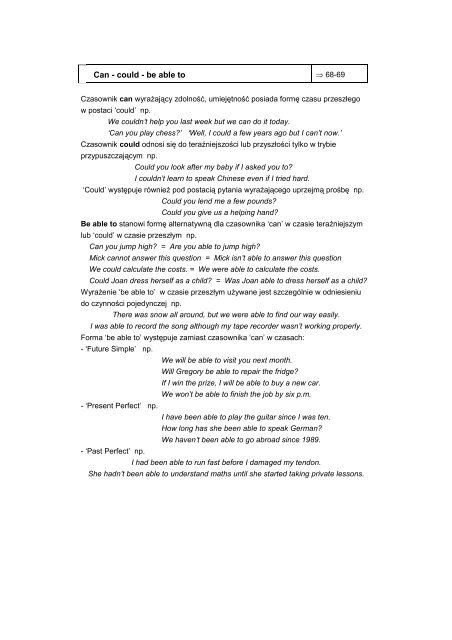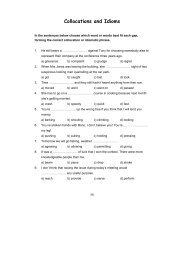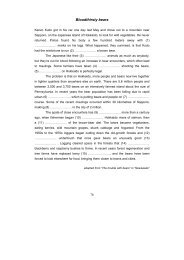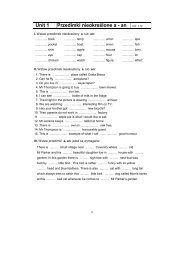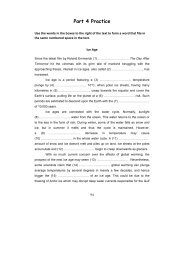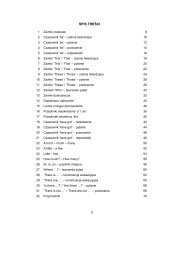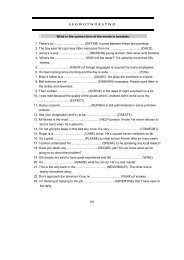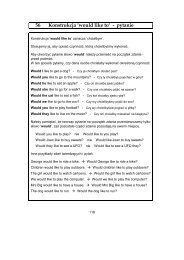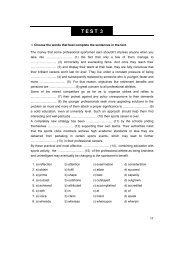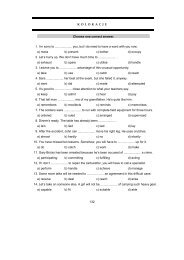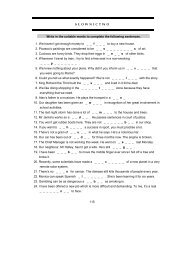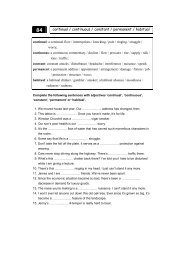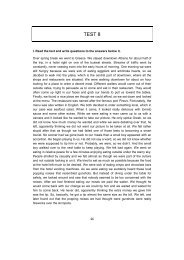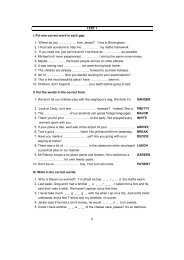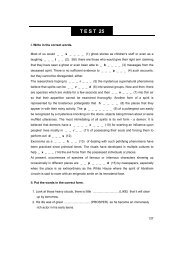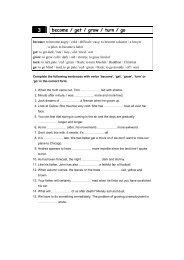Can - could - be able to - HandyBooks
Can - could - be able to - HandyBooks
Can - could - be able to - HandyBooks
- No tags were found...
You also want an ePaper? Increase the reach of your titles
YUMPU automatically turns print PDFs into web optimized ePapers that Google loves.
<strong>Can</strong> - <strong>could</strong> - <strong>be</strong> <strong>able</strong> <strong>to</strong> ⇒ 68-69<br />
Czasownik can wyraŜający zdolność, umiejętność posiada formę czasu przeszłego<br />
w postaci ‘<strong>could</strong>’ np.<br />
We <strong>could</strong>n’t help you last week but we can do it <strong>to</strong>day.<br />
‘<strong>Can</strong> you play chess’ ‘Well, I <strong>could</strong> a few years ago but I can’t now.’<br />
Czasownik <strong>could</strong> odnosi się do teraźniejszości lub przyszłości tylko w trybie<br />
przypuszczającym np.<br />
Could you look after my baby if I asked you <strong>to</strong><br />
I <strong>could</strong>n’t learn <strong>to</strong> speak Chinese even if I tried hard.<br />
‘Could’ występuje równieŜ pod postacią pytania wyraŜającego uprzejmą prośbę np.<br />
Could you lend me a few pounds<br />
Could you give us a helping hand<br />
Be <strong>able</strong> <strong>to</strong> stanowi formę alternatywną dla czasownika ‘can’ w czasie teraźniejszym<br />
lub ‘<strong>could</strong>’ w czasie przeszłym np.<br />
<strong>Can</strong> you jump high = Are you <strong>able</strong> <strong>to</strong> jump high<br />
Mick cannot answer this question = Mick isn’t <strong>able</strong> <strong>to</strong> answer this question<br />
We <strong>could</strong> calculate the costs. = We were <strong>able</strong> <strong>to</strong> calculate the costs.<br />
Could Joan dress herself as a child = Was Joan <strong>able</strong> <strong>to</strong> dress herself as a child<br />
WyraŜenie ‘<strong>be</strong> <strong>able</strong> <strong>to</strong>’ w czasie przeszłym uŜywane jest szczególnie w odniesieniu<br />
do czynności pojedynczej np.<br />
There was snow all around, but we were <strong>able</strong> <strong>to</strong> find our way easily.<br />
I was <strong>able</strong> <strong>to</strong> record the song although my tape recorder wasn’t working properly.<br />
Forma ‘<strong>be</strong> <strong>able</strong> <strong>to</strong>’ występuje zamiast czasownika ‘can’ w czasach:<br />
- ‘Future Simple’ np.<br />
We will <strong>be</strong> <strong>able</strong> <strong>to</strong> visit you next month.<br />
Will Gregory <strong>be</strong> <strong>able</strong> <strong>to</strong> repair the fridge<br />
If I win the prize, I will <strong>be</strong> <strong>able</strong> <strong>to</strong> buy a new car.<br />
We won’t <strong>be</strong> <strong>able</strong> <strong>to</strong> finish the job by six p.m.<br />
- ‘Present Perfect’ np.<br />
I have <strong>be</strong>en <strong>able</strong> <strong>to</strong> play the guitar since I was ten.<br />
How long has she <strong>be</strong>en <strong>able</strong> <strong>to</strong> speak German<br />
We haven’t <strong>be</strong>en <strong>able</strong> <strong>to</strong> go abroad since 1989.<br />
- ‘Past Perfect’ np.<br />
I had <strong>be</strong>en <strong>able</strong> <strong>to</strong> run fast <strong>be</strong>fore I damaged my tendon.<br />
She hadn’t <strong>be</strong>en <strong>able</strong> <strong>to</strong> understand maths until she started taking private lessons.
May - might ⇒ 70<br />
Czasowniki modalne ‘may’ i ‘might’ słuŜą do wyraŜenia przypuszczenia lub moŜliwości<br />
w czasie teraźniejszym lub przyszłym. Forma ‘might’ wzmacnia niepewność danego<br />
przypuszczenia np.<br />
I don’t know this man at all. He might <strong>be</strong> a new worker here.<br />
John may <strong>be</strong> in the canteen now, but I’m not sure.<br />
‘When is Louis coming back’ ‘I don’t know exactly. He might come back next week.’<br />
Czasowniki ‘may’ oraz ‘might’ mogą takŜe wyraŜać przypuszczenie w postaci<br />
czynności trwającej np.<br />
‘What is Ben doing’ ‘He may / might <strong>be</strong> sitting in the garden.’<br />
Hurry up! Your friends may already <strong>be</strong> waiting for you.<br />
‘Might’ występuje w trybie przypuszczającym lub po czasowniku w czasie przeszłym<br />
(mowa zaleŜna) np.<br />
She might help you with maths if you asked her <strong>to</strong>.<br />
What might happen if I <strong>to</strong>uched the fuse<br />
Debbie said she might <strong>be</strong> busy in the evening.<br />
We knew there might <strong>be</strong> problems with communication.<br />
May - <strong>be</strong> allowed <strong>to</strong> ⇒ 71<br />
Czasownik ‘may’ wyraŜający pozwolenie lub zakaz wykonania danej czynności odnosi<br />
się do czasu teraźniejszego lub przyszłego. Forma ‘might’ s<strong>to</strong>sowana jest tylko w<br />
trybie przypuszczającym lub po czasowniku w czasie przeszłym (mowa zaleŜna).<br />
Be allowed <strong>to</strong> - jest wyraŜeniem alternatywnym dla czasownika ‘may’ w czasie<br />
teraźniejszym np.<br />
I may smoke cigarettes. = I am allowed <strong>to</strong> smoke cigarettes.<br />
May they play here = Are they allowed <strong>to</strong> play here<br />
‘Be allowed <strong>to</strong>’ występuje w czasach ‘Perfect’, ‘Past’ oraz ‘Future’, w których<br />
czasownika ‘may’ nie s<strong>to</strong>suje się. Zwrot ten uŜywany jest szczególnie w odniesieniu<br />
do czynności pojedynczej np.<br />
I showed the mem<strong>be</strong>rship card and I was allowed <strong>to</strong> enter the club.<br />
We weren’t allowed <strong>to</strong> spend the night outside the boarding house.<br />
W znaczeniu pozwolenia lub zakazu w czasie przeszłym zamiast ‘<strong>be</strong> allowed <strong>to</strong>’<br />
moŜna zas<strong>to</strong>sować czasownik ‘<strong>could</strong>’ np.<br />
I was allowed <strong>to</strong> copy the files. = I <strong>could</strong> copy the files.<br />
They weren’t allowed <strong>to</strong> use the room. = They <strong>could</strong>n’t use the room.
Zas<strong>to</strong>sowanie ‘<strong>be</strong> allowed <strong>to</strong>’ w czasach ‘Perfect’ i ‘Future’.<br />
Czasownik modalny ‘may’ nie występuje w czasach ‘Future’ oraz ‘Perfect’. W tych<br />
konstrukcjach ‘may’ zastępowany jest wyraŜeniem ‘<strong>be</strong> allowed <strong>to</strong>’ np.<br />
Simon has <strong>be</strong>en allowed <strong>to</strong> borrow books from the library since he <strong>be</strong>came a student.<br />
We hadn’t <strong>be</strong>en allowed <strong>to</strong> go abroad until the regulations changed.<br />
I haven’t <strong>be</strong>en allowed <strong>to</strong> drive since the accident.<br />
Unless you sign the petition, you won’t <strong>be</strong> allowed <strong>to</strong> take part in the meeting.<br />
By <strong>to</strong>morrow, he will have <strong>be</strong>en allowed <strong>to</strong> stay out of hospital for ten days.<br />
Must - have <strong>to</strong> ⇒ 72<br />
Czasownik modalny ‘must - musieć’ słuŜy do wyraŜania konieczności w czasie<br />
teraźniejszym oraz przyszłym np.<br />
I must hurry up now.<br />
You must talk <strong>to</strong> the professor <strong>to</strong>morrow.<br />
W znaczeniu wyraŜającym konieczność czasownik ‘must’ występuje tylko w zdaniach<br />
twierdzących i pytających np.<br />
‘Must we clean the paths, <strong>to</strong>o’ ‘Yes, you must do it everyday.’<br />
Mrs McGrath must cook meals for all her children.<br />
Forma zaprzeczona ‘must not - mustn’t’ wyraŜa zakaz np.<br />
Soldiers mustn’t leave the barracks without permission.<br />
‘Have <strong>to</strong> - musieć’ słuŜy do wyraŜania konieczności we wszystkich czasach,<br />
stanowiąc formę zastępującą ‘must’ w czasach ‘Future’, ‘Past’, oraz ‘Perfect’ np.<br />
‘I must do my homework now.’ ‘I will have <strong>to</strong> do mine <strong>to</strong>morrow.’<br />
‘We must write a report <strong>to</strong>day.’ ‘We had <strong>to</strong> write one last week.’<br />
‘I must learn hard now.’ ‘I have had <strong>to</strong> learn hard for two years now.’<br />
‘Must’ słuŜy najczęściej do wyraŜania konieczności narzuconej przez drugą osobę<br />
np.<br />
A boss <strong>to</strong> a worker: ‘You must remem<strong>be</strong>r about the regulations.’<br />
A teacher <strong>to</strong> a pupil: ‘You must rewrite your exercise.’<br />
‘Have <strong>to</strong>’ słuŜy do wyraŜenia konieczności przez osobę, której <strong>be</strong>zpośrednio dotyczy<br />
np.<br />
A worker: ‘I have <strong>to</strong> remem<strong>be</strong>r about the regulations.’<br />
A pupil: ‘I have <strong>to</strong> rewrite my exercise.’<br />
Czasownik ‘have <strong>to</strong>’ częściej uŜywany jest do wyraŜania konieczności regularnych,<br />
na<strong>to</strong>miast ‘must’ wyraŜa zwykle konieczność w przypadku pojedynczym lub<br />
trak<strong>to</strong>waną jako niezwykle pilną np.<br />
We have <strong>to</strong> feed the geese twice a day.<br />
Alan usually pays the bills, but he’s away, so I must do it this time.
! Czasownik ‘have <strong>to</strong> / had <strong>to</strong>’ ma postać zwykłego czasownika, dlatego pytanie<br />
oraz przeczenie do niego tworzy się za pomocą opera<strong>to</strong>rów czasu teraźniejszego<br />
oraz przeszłego - ‘do / did’ - nie poprzez inwersję np.<br />
Do you have <strong>to</strong> buy tickets everyday<br />
We don’t have <strong>to</strong> replace the wiring so often.<br />
Did your sister have <strong>to</strong> find a new job<br />
I didn’t have <strong>to</strong> ask my parents for money.<br />
Mustn’t - needn’t - don’t have <strong>to</strong> ⇒ 73<br />
Czasownik modalny ‘need - musieć’, wyraŜający konieczność w czasie teraźniejszym<br />
lub przyszłym występuje najczęściej w złoŜonych zdaniach twierdzących np.<br />
I think I need ask her for permission.<br />
‘Need’ występuje częściej pod postacią zaprzeczenia ‘needn’t’, wyraŜając brak<br />
konieczności w czasie teraźniejszym lub przyszłym np.<br />
George needn’t come <strong>to</strong> work on Saturday.<br />
We needn’t exchange any more money.<br />
Czasownik ‘needn’t’ występuje częs<strong>to</strong> jako określenie braku konieczności wyraŜone<br />
przez inną osobę np.<br />
Mike: ‘How about cleaning the s<strong>to</strong>ve’<br />
Adam: ‘You needn’t do it. Someone else will clean it.’<br />
Anne: ‘Shall I mind the baby this evening’<br />
Betty: ‘No, you needn’t come <strong>to</strong>night.’<br />
! Czasownik ‘need’ moŜe wystąpić zarówno w postaci czasownika modalnego, jak<br />
i czasownika zwykłego. Jako czasownik modalny ‘need’ zachowuje wszystkie cechy<br />
tej grupy np.<br />
‘Need I work overtime this week’<br />
‘No, you needn’t stay longer in the office.’<br />
Jako zwykły czasownik ‘need’ moŜe wystąpić w kaŜdej formie czasowej wraz<br />
z pełnym <strong>be</strong>zokolicznikiem czasownika, tworząc pytania oraz zaprzeczenia przy<br />
uŜyciu opera<strong>to</strong>rów np.<br />
We needed <strong>to</strong> replace the faulty circuit.<br />
Did Helen need <strong>to</strong> ask for help<br />
You will need <strong>to</strong> talk <strong>to</strong> the teacher soon.<br />
Mike doesn’t need <strong>to</strong> take the dog for a walk.<br />
I have <strong>be</strong>en needing you badly.<br />
‘Mustn’t’ - słuŜy jedynie do wyraŜenia zakazu w czasie teraźniejszym lub przyszłym<br />
np.


